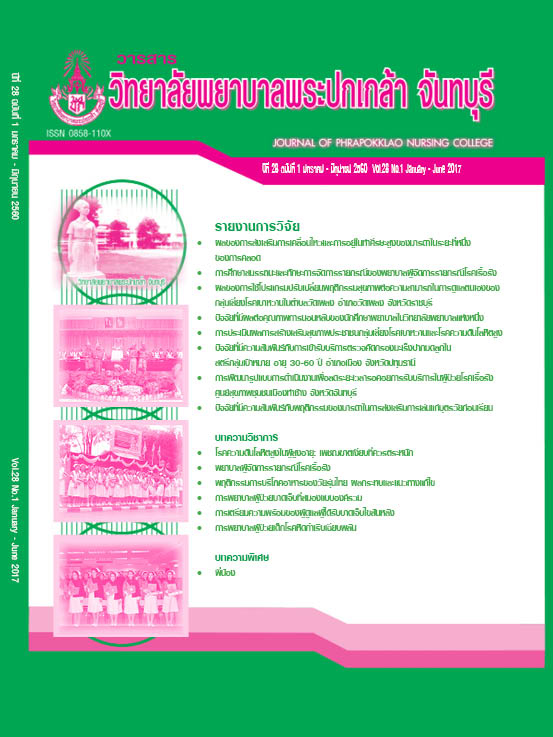The Study of Case Management’s Competencies and Skills of Chronic Disease Nurse Case Manager
Keywords:
Case management’s competency and skill, Nurse case manager, Chronic diseaseAbstract
This descriptive research aimed to study the significant and belonging of case management competencies and skills of nurse case manager. The samples consisted of 51 registered nurses who passed the Program of Nursing Specialty in Nurse Case Management for Chronic Disease (Diabetes and Hypertension) class 1 from Boromarajonani College of Nursing Phra-putthabat. The research instrument was a questionnaire that composed of 3 parts, including general data, case management’s competencies, and case management’s skills with the reliability of .93 and .85, respectively. Data were collected in July, 2015. Statistics used for data analysis included frequency, percentage, mean, standard deviation, and independent t-test.
The results revealed that the overall average scores of significant and belonging of case management’s competencies were at a highest level and a high level, respectively (= 4.53, SD = .54 and = 3.85, SD = .59, respectively). The overall average scores of significant and belonging of case management’s skills were at a highest level and a moderate level, respectively (= 4.42, SD = .63 and = 3.38, SD = .59, respectively), and the average scores of belonging of case management’s competencies and skills had statistically significant lower than the average scores of significant of case management’s competencies and skills (t = 6.992, p < .001 and t = 11.528, p < .001, respectively).
This study suggested that the results of this study should be implemented for promoting the case management’s competencies and skills. Moreover, nursing institutes should apply the case management’s concepts for learning and teaching administration.
References
กฤษดา จวนวันเพ็ญ, บุญทิพย์ สิริธรังศรี, และบุญจง แซ่จึง. (2557). การพัฒนารูปแบบการจัดการพยาบาลผู้ป่วยรายกรณีสำหรับการดูแลผู้ป่วยภาวะกล้ามเนื้อหัวใจตายเฉียบพลัน. วารสารวิทยาลัยพยาบาลบรมราชชนนี นครราชสีมา, 20(1), 80-94.
เครือข่ายวิจัยกลุ่มสถาบันแพทยศาสตร์แห่งประเทศไทย. (2555). รายงานการประเมินผลการดูแลผู้ป่วยโรคเบาหวานชนิดที่ 2 และความดันโลหิตสูง ของโรงพยาบาลในสังกัดกระทรวงสาธารณสุข และโรงพยาบาลในสังกัดกรุงเทพมหานคร ประจำปี 2555. สืบค้น วันที่ 15 พฤษภาคม 2557, จาก http://dmht.thaimedresnet.org/files/DHMT_SLIDE_ph4_ajr.pdf
เครือข่ายวิจัยกลุ่มสถาบันแพทยศาสตร์แห่งประเทศไทย. (2557). รายงานการประเมินผลการดูแลผู้ป่วยโรคเบาหวานชนิดที่ 2 และความดันโลหิตสูง ของโรงพยาบาลในสังกัดกระทรวงสาธารณสุข และโรงพยาบาลในสังกัดกรุงเทพมหานคร ประจำปี 2557. สืบค้น วันที่ 15 พฤษภาคม 2560, จาก http://dmht.thaimedresnet.org/files_2558/57DMHT_2014_ALL_Ontour.pdf
บุญใจ ศรีสถิตย์นรากูร. (2553). ระเบียบวิธีการวิจัยทางพยาบาลศาสตร์ (พิมพ์ครั้งที่ 5). กรุงเทพฯ: ยูแอนด์ไอ อินเตอร์มีเดีย.
ภัคพร กอบพึ่งตน, ชนกพร อุตตะมะ, นาฏยา เอื้องไพโรจน์, และปริชาติ ขันทรักษ์. (2554). การพัฒนาระบบการจัดการผู้ป่วยรายกรณีในผู้ป่วยโรคปอดอุดกั้นเรื้อรัง โรงพยาบาลนครพิงค์. วารสารพยาบาลศาสตร์และสุขภาพ, 34(2), 22-31.
ศิริอร สินธุ. (2555). เอกสารประกอบการอบรมหลักสูตรการพยาบาลเฉพาะทาง สาขาการพยาบาลผู้จัดการรายกรณีโรคเรื้อรัง (เบาหวานและความดันโลหิตสูง) เรื่อง ขอบเขต บทบาท และสมรรถนะของพยาบาลผู้จัดการรายกรณี. นนทบุรี: สภาการพยาบาล.
ศิริอร สินธุ, และคณะ. (2554). หลักสูตรฝึกอบรมการพยาบาลเฉพาะทาง สาขาการพยาบาลผู้จัดการรายกรณีโรคเรื้อรัง (เบาหวานและความดันโลหิตสูง). นนทบุรี: สภาการพยาบาล.
ศิริอร สินธุ, และพิเชต วงรอต. (บ.ก.). (2557). การจัดการรายกรณีผู้ป่วยโรคเบาหวานและความดันโลหิตสูง (พิมพ์ครั้งที่ 2). กรุงเทพฯ: โรงพิมพ์วัฒนาการพิมพ์.
อนุศร การะเกษ, และนงลักษณ์ เมธากาญจนศักดิ์. (2560). ผลของรูปแบบการพยาบาลผู้จัดการรายกรณีต่อผลลัพธ์ที่คัดสรรในการดูแลผู้ป่วยโรคเบาหวานชนิดที่ 2 ที่มีภาวะน้ำตาลต่ำในเลือด ณ แผนกอุบัติเหตุ-ฉุกเฉิน. วารสารการพยาบาลและการดูแลสุขภาพ, 35(1), 119-127.
อัมภา สีแสด. (2557). องค์ประกอบและระดับสมรรถนะพยาบาลผู้จัดการรายกรณีโรงพยาบาลชุมชน. สืบค้น วันที่ 15 พฤษภาคม 2557, จาก http://old.rmutto.ac.th/fileupload/Wannasa%20Balsong6oral344-362.pdf
Cohen, E. L., & Cesta, T. G. (Eds.). (2005). Nursing case management: From essentials to advanced practice applications (4th ed.). St. Louis: Mosby Elsevier.
Ishani, A., et al. (2011). Effect of nurse case management compared with usual care on controlling cardiovascular risk factors in patients with diabetes: A randomized controlled trial. Diabetes Care, 34(8), 1689-1694.
Lupari, M., Coates, V., Adamson, G., & Crealey, G. E. (2011). “We’re just not getting it right’-how should we provide care to the older person with multi-morbid chronic conditions?. Journal of Clinical Nursing, 20(9-10), 1225-1235.
Mullahy, C. M., & Boling, J. (2008). The case manager as change agent in a new and improved healthcare model. Professional Case Management, 13(5), 286-289.
Mullahy, C. M., & Jensen, D. K. (2004). The case manager’s handbook. Burlington, MA: Jones and Bartlett Learning.
Powell, S. K., & Tahan, H. A. (2010). Case management: A practical guide for education and practice (3rd ed.). Philadelphia: Lippincott Williams & Wilkins.
Sutherland, D., & Hayter, M. (2009). Structured review: Evaluating the effectiveness of nurse case managers in improving health outcomes in three major chronic diseases. Journal of Clinical Nursing, 18(21), 2978-2992.
You, E. C., Dunt, D., & Doyle, C. (2016). Important case management goals in community aged care practice and key influences. Care Management Journal, 17(1), 47-60.
Downloads
Published
How to Cite
Issue
Section
License
Copyright (c) 2017 Journal of Phrapokklao Nursing College

This work is licensed under a Creative Commons Attribution-NonCommercial-NoDerivatives 4.0 International License.
เนื้อความ ข้อมูล และรายการอ้างอิงที่ผู้เขียนใช้ในการเขียนบทความเพื่อลงตีพิมพ์ในวารสารวิทยาลัยพยาบาลพระปกเกล้า จันทบุรี ถือเป็นความคิดเห็นและความรับผิดชอบของผู้เขียน คณะผู้จัดทำวารสารไม่จำเป็นต้องเห็นพ้องด้วยหรือร่วมรับผิดชอบ
บทความที่ได้รับการลงตีพิมพ์ในวารสารวิทยาลัยพยาบาลพระปกเกล้า จันทบุรี ถือเป็นลิขสิทธิ์ของวารสารวิทยาลัยพยาบาลพระปกเกล้า จันทบุรี หากหน่วยงานหรือบุคคลใดต้องการนำส่วนหนึ่งหรือทั้งหมดของบทความไปเผยแพร่ต่อเพื่อวัตถุประสงค์ใด ๆ จะต้องได้รับอนุญาตจากบรรณาธิการวารสารก่อน



